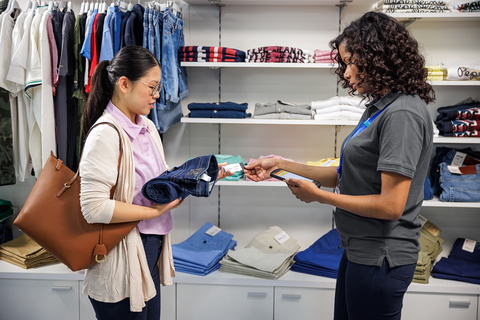Self-Serve Drives Seven-in-10 Shoppers’ Improved Satisfaction with Retail Associates
Zebra Technologies (NASDAQ: ZBRA) reported positive trends from its 15th Annual Global Shopper Study, indicating that shoppers are returning to in-store shopping post-pandemic. Approximately 76% of shoppers prefer quick transactions, increasingly utilizing self-checkout and mobile payment options. Retailers are adjusting by adopting self-serve technologies. However, inflation has caused nearly 75% of shoppers to delay purchases. The study highlights a growing expectation for seamless shopping experiences across online and physical stores, emphasizing the need for enhanced inventory management as out-of-stocks emerge as a major concern.
- 77% of retailers believe staffed checkouts are becoming less necessary due to automation.
- 70% of shoppers report satisfaction with assistance from retail associates, up from 37% in 2007.
- 80% of shoppers expect retailers to provide the latest technology.
- 75% of shoppers report inflation has delayed their purchases.
- 76% of shoppers leave stores without intended items due to out-of-stocks, with 49% citing this as the reason.
- 80% of retailers struggle with real-time visibility of out-of-stocks.
Insights
Analyzing...
Zebra Technologies’ 15th annual study shows steady progress in shopper satisfaction as self-serve technology frees associates to step-up service, speed and convenience

Zebra Technologies’ 15th annual study shows steady progress in shopper satisfaction as self-serve technology frees associates to step-up service, speed and convenience. (Photo: Business Wire)
While nearly
Forty-three percent of shoppers surveyed prefer paying with a mobile device/smartphone (+23pp since 2019) and half prefer self-checkout (up +19pp since 2019) as preference for a traditional check-out register staffed by a person has declined (-20pp since 2019). A majority of retailers (
Consumers also continue to rely on their smartphones during shopping trips; this year’s usage indicates price sensitivity as over half of those surveyed are checking for sales, specials or coupons, aligning with
Shoppers’ “Everything Experience”
Consumers expect a seamless experience however they shop. Seven-in-10 prefer shopping both in-store and online as well as favor online retailers that also offer brick-and-mortar locations. Convenience is king for fulfillment: most shoppers (
“Shoppers don’t see channels, they see one shopping experience however they shop,” said
While nearly eight-in-10 shoppers are concerned about inflationary price increases on everyday essentials, they’re not necessarily leaving stores without the items they wanted due to price. Associates expressed out-of-stock complaints as their number one frustration. A whopping
Leveraging Labor
Seven-in-10 shoppers are satisfied with help from retail associates, compared to only
To further improve the shopping experience, eight-in-10 retailers surveyed expect to enable more associates/seasonal staff to help customers and pick/fulfill online orders for the 2022 holiday season. This also addresses another challenge cited by three-quarters of surveyed retailers: improving online fulfillment efficiency and expense.
“After 15 years of studying shoppers, associates, and retailers, one constant is clear—retail is always changing,” Guiste said. “The expectations, experiences, and behaviors of shoppers, associates and retail executives continue to evolve at an increasingly rapid pace. Only when technology and people come together, both in vision for tomorrow and ability to execute today, can retailers consistently deliver the experiences customers expect. Retail is at a point where technology isn’t just a want or nice to have—it’s a must have.”
KEY REGIONAL FINDINGS
-
APAC had the highest percentage of retailers (
80% ) who agree upskilling/reskilling current store staff is a significant challenge. -
Holiday shoppers in APAC expect over half (
54% ) of their holiday purchases to be in stores.
-
Second only to APAC (
68% ),Europe (69% ) has seen the lowest impact of inflation on shoppers delaying purchases, compared to other regions surveyed globally. -
Over six-in-10 associates in
Europe agree managing returns of online orders is a significant challenge.
-
Only
68% of retailers surveyed in Latin American agree shoppers are spending less due to inflation, compared to82% who believe they are spending less globally. -
Nine-in-10 shoppers in
Latin America have used mobile ordering, leading globally.
-
Sixty-nine percent of shoppers surveyed in
North America agree more retailers need to offer mobile ordering. -
Over
90% of retail decision-makers surveyed say they are increasing the speed and convenience of fulfillment options for holiday orders.
SURVEY BACKGROUND AND METHODOLOGY
Zebra’s 15th Annual Global Shopper Study surveyed over 4,200 shoppers, store associates and retail decision-makers globally to gauge the opinions and expectations on today’s shopper experience, technology usage and fulfillment in June –
ABOUT ZEBRA TECHNOLOGIES
Zebra (NASDAQ: ZBRA) empowers organizations to thrive in the on-demand economy by making every front-line worker and asset at the edge visible, connected and fully optimized. With an ecosystem of more than 10,000 partners across more than 100 countries, Zebra serves customers of all sizes – including
ZEBRA and the stylized Zebra head are trademarks of
View source version on businesswire.com: https://www.businesswire.com/news/home/20221025005369/en/
Media Contact:
+1-631-738-4751
bill.abelson@zebra.com
Industry Analyst Contact:
+1-224-306-8654
k.fahmy@zebra.com
Source:







